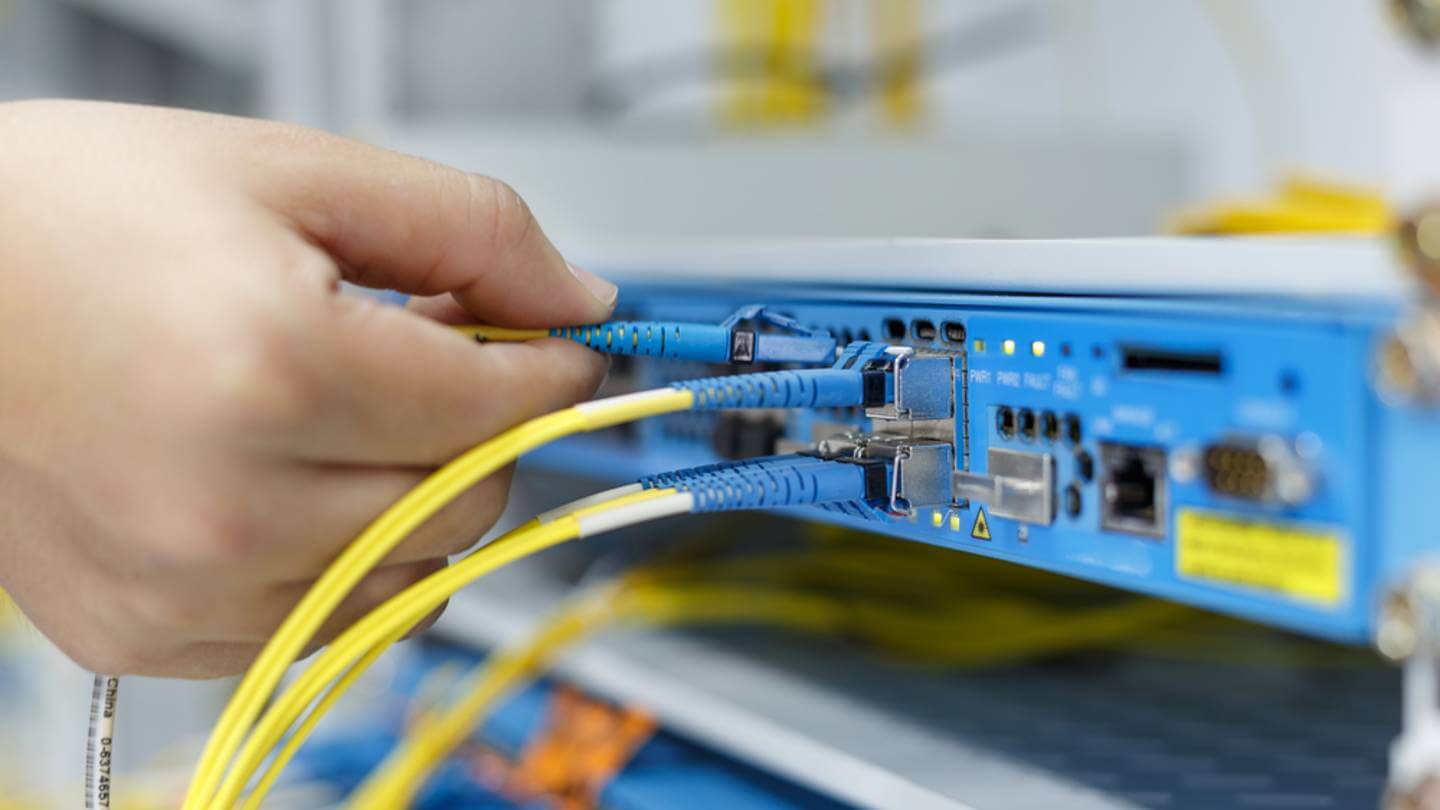Main differences between cable and fiber
The technical difference between fiber and cable internet is the type of cables used to provide homes with an internet connection. Find out how these cables differ and why that matters when it comes to speed, reliability, availability and pricing.
Fiber Internet pros and cons
-
Great speeds
-
Reliability
-
Security
-
Prone to damage
-
Expensive
-
Less availability
Fiber internet, also known as fiber optic, is a type of broadband connection that uses fiber optic cables to transmit data through light signals. Fiber optic is a newer type of technology, compared to cable internet, which is one of the reasons it is not as widely available.
If fiber is available to you, however, it is likely your best option, as fiber optic is known for being a faster and more reliable form of internet, compared to cable, DSL or satellite internet. The main selling point of fiber internet is that speeds can reach up to 6,000 Mbps and the fiber optic cables are less susceptible to weather conditions than traditional cables. Find out if fiber internet is available at your address.
Cable Internet pros and cons
-
Widely available
-
TV bundle options
-
Affordable
-
Lower speeds than fiber
-
Less reliable
Cable internet is a type of broadband connection that uses copper coaxial cable lines to transmit data through radio frequency signals. Cable internet uses the same coaxial cable line that cable TV uses, which is why most cable internet providers offer internet and TV bundle deals.
Cable internet is a widely available type of internet service. Cable internet is much more available than fiber internet because the cables are much easier to install. Although cable internet tends not to provide as fast internet as fiber, it is still a superior option compared to DSL or satellite internet.
Fiber vs. cable comparison
| Price* | Download speeds** | Nationwide availability | |
|---|---|---|---|
| Fiber | $29.99 – $299.95/mo. | 200 – 6,000 Mbps | 43% |
| Cable | $19.99 – $299.95/mo. | 25 – 3,000 Mbps | 89% |
*Pricing per month plus taxes for length of contract. Additional fees and terms may apply. Pricing varies by location and availability. All prices subject to change at any time. May or may not be available based on service address. **Wireless speeds may vary. Last updated 09/20/22.
Is fiber or cable internet better?
Overall, fiber internet tends to be a better value than cable internet. Although cable offers the cheapest internet plans, fiber optic offers significantly faster upload and download speeds for only a few dollars more each month. Therefore, for those who have the option of selecting a fiber optic provider, that is most likely your best bet.
Fiber vs. cable speed comparison
Download speeds: Although both fiber and cable internet will provide the speed you need for streaming, work from home, gaming and more, fiber internet can reach higher max speeds (3,000 Mbps) and tends to offer a cheaper cost/Mbps than cable.
Upload speeds: When it comes to upload speeds, fiber internet is the clear winner. All fiber internet providers have near-symmetrical upload and download speeds. In contrast, cable internet providers will supply significantly slower upload speeds than their download speeds (the speed that is advertised).
Fiber vs. cable availability
Fiber optic is currently not as widely available as cable internet, according to the FCC. Fiber optic internet providers, however, are working as quickly as they can to continue to expand their services throughout the country.
Fiber internet – 43%
Cable internet – 89%
Fiber vs. cable provider comparison
Fiber plans are more costly than most cable plans, but you are paying for faster speed with nearly symmetrical upload and download speeds. AT&T is a fiber leader, offering 300 Mbps for just $55/mo. It covers about 11% of the country with speeds up to 5 gig, some of the fastest in the country. There are other providers hitting 10,000 Gbps, but those service areas are limited.
| Provider | Internet type | Price range | Download speeds | Upload speeds |
|---|---|---|---|---|
| AT&T | Fiber | $55.00 to $180.00/mo. | 300 to 4,700 Mbps | Symmetrical |
| CenturyLink | Fiber | $30.00 to $70.00/mo. | 200 to 940 Mbps | Symmetrical |
| Spectrum | Cable (hybrid) | $49.99 to $89.99/mo. | 300 to 1,000 Mbps | 10 to 35 Mbps |
| Cox | Cable (hybrid) | $49.99 to $149.99/mo. | 100 to 2,000 Mbps | 5 to 35 Mbps |
| Xfinity | Cable (hybrid) | $24.99 to $299.95/mo. | 75 to 6,000 Mbps | 10 to 6,000 Mbps |
Fiber and cable internet FAQs
Yes, fiber optic internet can reach up to 6,000 Mbps, whereas cable internet can only reach 3,000 Mbps. Fiber optic also offers significantly faster upload speeds than cable internet.
The greatest differences between fiber and cable internet are speed and availability. Although fiber internet offers faster and more reliable speeds than cable internet, cable internet is available in significantly more parts of the U.S. than fiber internet.
Yes. Fiber internet is not the only type of internet that offers high-speed internet. For instance, cable internet can reach up to 3,000 Mbps, which is more than enough speed for most households.
Fiber internet availability is growing throughout the country; however, the process of installing fiber optic cables is extremely lengthy. For this reason, it will likely be a while until fiber internet is as widely available as cable internet.

Written by:
Camryn Smith
Cammy is a writer with Allconnect, growing her broadband industry knowledge for over a year on the internet marketplace. Her expertise lies in home internet and broadband service with a focus on providers, plans…
Read more
Edited by:
Robin LaytonEditor, Broadband Content
-
Featured
![10 questions you should ask before choosing an internet service]() 10 questions you should ask before choosing an internet service Ari Howard — 7 min read
10 questions you should ask before choosing an internet service Ari Howard — 7 min read -
Featured
![How to lower your internet bill]() How to lower your internet bill Camryn Smith — 6 min read
How to lower your internet bill Camryn Smith — 6 min read -
Featured
![How much internet speed do I need?]() How much internet speed do I need? Joe Supan — 9 min read
How much internet speed do I need? Joe Supan — 9 min read
Latest
-
Thursday, July 25, 2024
Worried about losing your signal? This is how to keep your satellite dish cleanDavid Anders — 6 min read
-
Tuesday, July 23, 2024
The best free TV and movie streaming services 2024Camryn Smith — 5 min read
-
Tuesday, July 23, 2024
Everything you need to know about internet speedsRobin Layton — 8 min read






